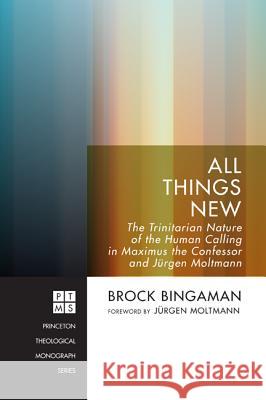All Things New » książka
All Things New
ISBN-13: 9781610974202 / Angielski / Miękka / 2014 / 194 str.
All Things New
ISBN-13: 9781610974202 / Angielski / Miękka / 2014 / 194 str.
(netto: 120,96 VAT: 5%)
Najniższa cena z 30 dni: 127,37
ok. 16-18 dni roboczych.
Darmowa dostawa!
For both Maximus the Confessor (c. 580-662) and Jurgen Moltmann (b. 1926), understanding what it means to be human springs from a contemplative vision of God. This comparative study explores surprising parallels between the theological anthropology of the seventh-century Byzantine monk and the contemporary German Protestant. Bingaman argues that Maximus and Moltmann root their understanding of the human calling in their Trinitarian and christological reflection, in contrast to many modern theologies that tend to devise an account of human being first, and then try to find ways in which Christ and the Trinity are somehow relevant to this human being. In this constructive work, Bingaman demonstrates the intrinsic connection between Maximus' and Moltmann's views of human being, Christ and the Trinity, the church, and the human calling in creation. Illustrating the richness of these ancient and postmodern theologies in conversation, All Things New lays out future trajectories in theological anthropology, patristic ressourcement, ecologically attuned theology and spirituality, and Orthodox-Protestant dialogue. ""A model of creative theological retrieval, All Things New makes a compelling case for understanding human identity and vocation as profoundly Trinitarian and christological. It presents a beautifully contemplative vision of the human person, arguing that it is the quality and depth of our attention to divine mystery that enables us to understand who we are and how we should live. An original and important work."" --Douglas E. Christie, professor, Theological Studies, Loyola Marymount University, Los Angeles, CA ""In this important book, Brock Bingaman brings Maximus the Confessor and Jurgen Moltmann into constructive dialogue. Without in any way trying to disguise the very different idioms in which they think, Bingaman shows how both Maximus and Moltmann base their reflections on the human calling and destiny in the doctrine of the Trinity and the Paschal mystery of Christ. It is a rich and stimulating work."" --Andrew Louth, Professor emeritus of Patristic and Byzantine Studies, Durham University, Durham, UK ""Bingaman's comparative study of Maximus the Confessor's and Jurgen Moltmann's theological anthropology continues a long-standing tradition of fruitful dialogue between Eastern Orthodox and Reformed theologies. Wide-ranging and evocative in its analysis, All Things New offers its readers ancient wisdom coupled with fresh ecological impulses for understanding the human calling in a Trinitarian framework today."" --Joy Ann McDougall, Associate Professor of Systematic Theology, Candler School of Theology, Emory University, Atlanta, GA Brock Bingaman is Assistant Professor of Religious Studies and Religious Studies Program Director at Wesleyan College in Macon, Georgia. His publications include The Philokalia: A Classic Text of Orthodox Spirituality (2012), coedited with Bradley Nassif, and numerous book chapters and journal articles on Christian spirituality, ecology, comparative theology, and Christian-Muslim relations.
For both Maximus the Confessor (c. 580-662) and Jurgen Moltmann (b. 1926), understanding what it means to be human springs from a contemplative vision of God. This comparative study explores surprising parallels between the theological anthropology of the seventh-century Byzantine monk and the contemporary German Protestant. Bingaman argues that Maximus and Moltmann root their understanding of the human calling in their Trinitarian and christological reflection, in contrast to many modern theologies that tend to devise an account of human being first, and then try to find ways in which Christ and the Trinity are somehow relevant to this human being.In this constructive work, Bingaman demonstrates the intrinsic connection between Maximus and Moltmanns views of human being, Christ and the Trinity, the church, and the human calling in creation. Illustrating the richness of these ancient and postmodern theologies in conversation, All Things New lays out future trajectories in theological anthropology, patristic ressourcement, ecologically attuned theology and spirituality, and Orthodox-Protestant dialogue.""A model of creative theological retrieval, All Things New makes a compelling case for understanding human identity and vocation as profoundly Trinitarian and christological. It presents a beautifully contemplative vision of the human person, arguing that it is the quality and depth of our attention to divine mystery that enables us to understand who we are and how we should live. An original and important work.""--Douglas E. Christie, professor, Theological Studies, Loyola Marymount University, Los Angeles, CA""In this important book, Brock Bingaman brings Maximus the Confessor and Jurgen Moltmann into constructive dialogue. Without in any way trying to disguise the very different idioms in which they think, Bingaman shows how both Maximus and Moltmann base their reflections on the human calling and destiny in the doctrine of the Trinity and the Paschal mystery of Christ. It is a rich and stimulating work.""--Andrew Louth, Professor emeritus of Patristic and Byzantine Studies, Durham University, Durham, UK""Bingamans comparative study of Maximus the Confessors and Jurgen Moltmanns theological anthropology continues a long-standing tradition of fruitful dialogue between Eastern Orthodox and Reformed theologies. Wide-ranging and evocative in its analysis, All Things New offers its readers ancient wisdom coupled with fresh ecological impulses for understanding the human calling in a Trinitarian framework today.""--Joy Ann McDougall, Associate Professor of Systematic Theology, Candler School of Theology, Emory University, Atlanta, GABrock Bingaman is Assistant Professor of Religious Studies and Religious Studies Program Director at Wesleyan College in Macon, Georgia. His publications include The Philokalia: A Classic Text of Orthodox Spirituality (2012), coedited with Bradley Nassif, and numerous book chapters and journal articles on Christian spirituality, ecology, comparative theology, and Christian-Muslim relations.











